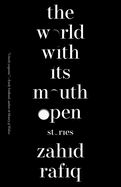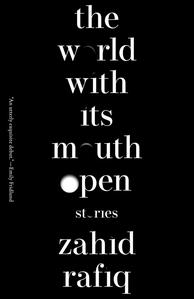
 Former journalist Zahid Rafiq's resounding debut collection, The World with Its Mouth Open, offers 11 stories that distill quotidian moments--a walk, job search, new neighbors--into opportunities for deep insight. Reflecting his own background, Rafiq's characters live in Kashmir--a disputed territory on the Indian subcontinent uneasily governed by India, Pakistan, and China. They navigate the demands of family, community, to survive amid looming chaos and violence.
Former journalist Zahid Rafiq's resounding debut collection, The World with Its Mouth Open, offers 11 stories that distill quotidian moments--a walk, job search, new neighbors--into opportunities for deep insight. Reflecting his own background, Rafiq's characters live in Kashmir--a disputed territory on the Indian subcontinent uneasily governed by India, Pakistan, and China. They navigate the demands of family, community, to survive amid looming chaos and violence.
Rafiq's title haunts "Crows," about a young boy subjected to vicious beatings from an in-demand (by desperately ambitious parents) tutor who absolutely won't accept underperformance: "Do you know what is waiting out there?," he ferociously rebukes, "The world... with its mouth open," ready to devour the unprepared. For a while, at least, the boy has a concerned, compassionate friend who bears witness by being the one to tell his story.
Victims reliant on others to record and remember their lives--and deaths--are many here; that indirect exposition seems to be Rafiq's clever reminder of an inevitable interconnectedness, even among strangers. In "Bare Feet," a young man who's returned home to "war and desolation" after three years in America, is visited by the spirit of a murdered boy: "Was that how it worked then, the dead... showing up in the dreams of strangers, in houses where no one knew them?" The lost shadow exhorts the man--despite the dangers the man will undoubtedly face--to find his home and alert his worried family of his grievous demise. A young journalist, with a penchant for beautiful things he can't afford, attempts to reverse death in "In Small Boxes," as he assuages a storeowner who's apoplectic after seeing his obituary in the newspaper when he's very much alive. "It is not a small thing. It is no joke. To tell someone's story. To write the truth," the storeowner insists, but the truth becomes muddled, leading to tragic misunderstandings.
In a society debilitated by destruction, Rafiq deftly finds glimmers of humanity, even among anthropomorphized canine residents in "Dogs" who, like their bipedal counterparts, exhibit bonded loyalty and exhausted disconnection. His characters have doctor appointments, get fired, fall in love, help and hurt each other. Rafiq writes succinctly, almost curtly, encouraging readers to piece together elliptical details to deduce the rewarding narrative: promises, flowers, ancestral grave plots, eventually reveal why a young man has come to the cemetery alone in "Flowers from a Dog." Hauntingly astute, Rafiq is a storyteller to watch--and closely read. --Terry Hong
Shelf Talker: Kashmiri writer Zahid Rafiq's debut collection transforms quotidian details of various characters living amid certain violence into insightful glimpses of (in)humanity.

